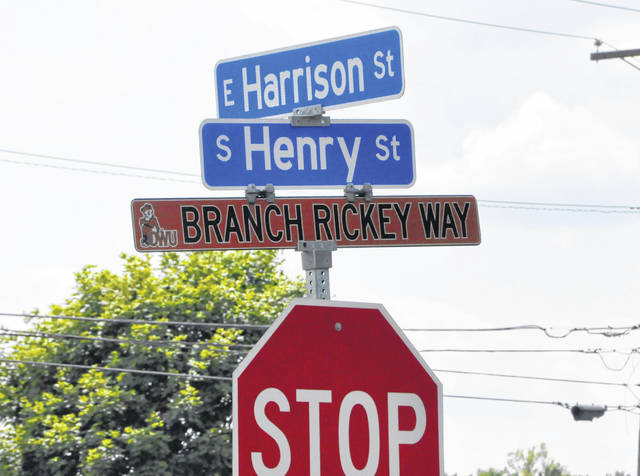
Two native sons of Delaware are receiving honorary street designations after Delaware City Council passed a resolution Aug. 12 to create Rutherford B. Hayes Way and Elmer W.B. Curry Way.
As detailed in a city fact sheet presented to council, Hayes, who served as the 19th U.S. president from 1877-1881, was born in the Hayes family home on William Street on Oct. 4, 1822.
“Prior to his presidency, Hayes was Ohio governor, served in the U.S. Congress, and was a Civil War general wounded in battle,” the fact sheet states. “The honorary street name effort coincides with a local volunteer committee’s project to erect a statue of Hayes at the southwest corner of William and Sandusky streets. The statue and honorary street name will permanently pay tribute to our native son, welcome visitors to the community, and serve as a downtown focal point.”
In honor of Hayes’ many achievements, the section of William Street from Union Street to Franklin street will be given the honorary designation (street sign to be installed at a later date) as Rutherford B. Hayes Way.
As for fellow native son Elmer Washington Bryant Curry, the fact sheet notes he was born in Delaware on South Street, now known as London Road, in 1871.
“Curry graduated in 1889 from Delaware High School, which was one of the few school districts in Ohio that allowed mixed-race classes. He continued his education by attending Ohio Wesleyan University for four years while working as a custodian there,” the fact sheet states. “He was the first African American to teach in Delaware City Schools, and over his career, he taught over 2,000 African American men, women and children. He started Place of Knowledge for Old and Young in January of 1889 on David Street in Delaware, later called Curry Normal and Industrial Institute in Urbana, Ohio.”
As a permanent memorial to Curry’s accomplishments and achievements, the section of London Road extending from South Sandusky Street to South Liberty Street will be given the honorary designation as Elmer W.B. Curry Way.
Street names
Also on Aug. 12, Delaware City Council heard a first reading of a proposed policy in regard to honorary street signs. Currently, there are no policies in place in regard to applications for proposed honorary street signs.
Included in the proposed guidelines are the applicant proposing to council the reasoning behind the proposal. Specifically, Assistant City Manager Kyle Kridler said any proposals need to be for someone who has local ties, whose “lifetime achievements have received local, state, or national notoriety for individual contributions to cultural arts, music, education, government, leadership, athletics, or science,” and those honorees will be considered 10 years or more posthumously.
Kridler said the reason for the 10-year posthumous guideline is to “ensure that the community is not applying for an individual based on an emotional response” and to “allow some time where history will often bring the truth to the surface to make sure that the individual was, in fact, honorable and should be honored within the community.”
An example of what an honorary sign would look like was shown during the meeting. The sign is a simple design, with a white background and black lettering. Kridler called the design “a very formal and clean look” that will keep the signs around the city “uniform.”
All honorary street signs will include the suffix, “Way,” along with the honoree’s name.
Mayor Carolyn Riggle asked about the “Pacer Way” (Euclid Avenue) and “Branch Rickey Way” (Henry Street) signs already existing in Delaware, which do include color schemes related to Delaware Hayes and Ohio Wesleyan University. Kridler said those signs wouldn’t be changed as part of the new honorary sign guidelines.
City Manager Tom Homan said there aren’t a lot of requests for honorary signs in Delaware but felt it would be beneficial to establish parameters for when they do appear before council.
Councilwoman Lisa Keller suggested lowering the 10-year waiting period before a proposal can be considered. “My concern with waiting the 10 years is that a lot of the individuals who would, perhaps, have that legacy information about the significance of the person could have already gone on to other things.”
“I don’t know that I think we need any term limit,” Riggle said. Councilman Kyle Rohrer agreed there doesn’t need to be a set time limit.
Keller added, “Setting the time frame assumes that we can’t make a logical decision because we’re too emotional, which I think is not giving us enough credit, honestly.”
Kridler reminded council the 10-year time limit isn’t just to avoid any emotional, knee-jerk decisions, but to also allow for any potential information, previously unknown, to surface that might change the worthiness of the individual being considered.
Homan said the modification to the guidelines would be made, and the ordinance will come back before council at its next meeting Monday, Aug. 26.


